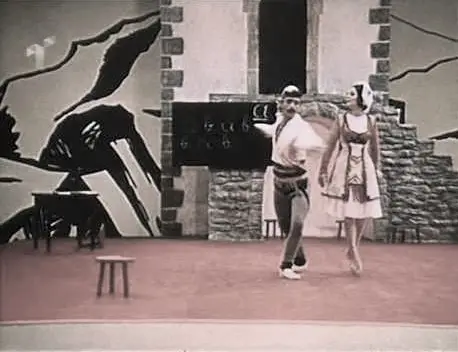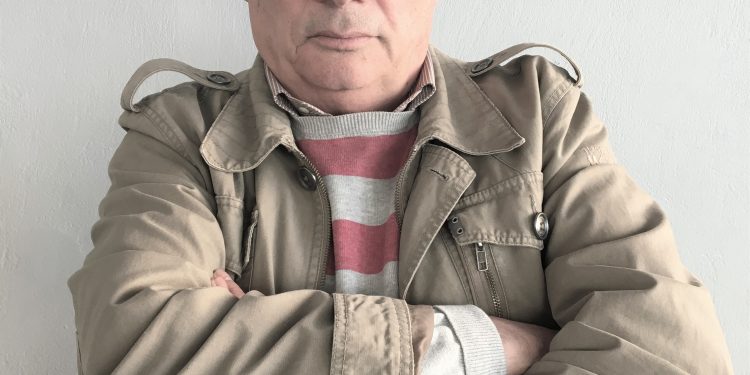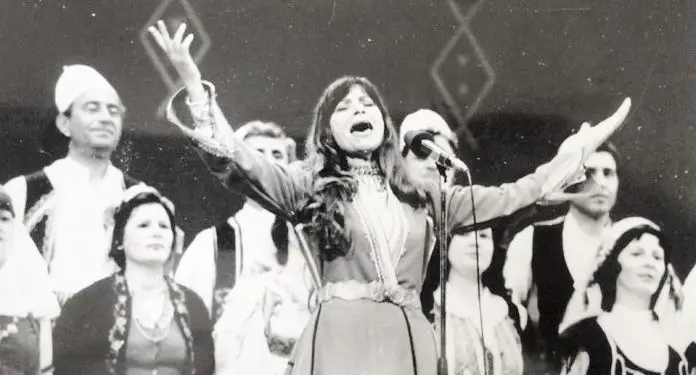From Uvil Zajmi
Memorie.al / The year 1974. It is the period when the whole of Albania was going through a difficult economic-social-political phase. After the 4th Plenum of the Central Committee of PPSh, for the suppression of foreign performances in art, culture, the 11th Song Festival on Radio-Television, accompanied by punishments, imprisonments, transfers of artists, a situation of almost terror , very gloomy for all the people, but it is mostly striking for the artists. Precisely in this situation, in a not at all normal atmosphere with the objective that the artists are close to ordinary people, the people even in the deepest areas, the Opera Theater is oriented to develop a tour in the North of Albania, the first and most the big one for the time, but even in the years to come, one of such proportions would never be organized again. It will be a giant body, where together with the Opera Theater; there is also the ballet troupe, accompanied by the orchestra, soloists, choir, singers, dancers, a group of about 200 people, including the background, with managers, fitters, stage managers, electricians, etc.
An exhausting trip and tour, in not at all comfortable conditions, with improvised scenes, systems in former prisons, mining silos. A tour that starts from Peshkopia, to end in Shkodër. Mihallaq Kora, violinist in the orchestra in those years and later, after almost four decades, I remember that tournament, even in detail, as if it happened yesterday. Arriving in Tirana from Turin, where he lives with his family, his wife Tatjana, (the well-known soprano of TOB), as he remembers detail after detail; the organization, the departure, the travels, the meeting with Fadil Paçram in Tuç i Puka, where they had just interned him after the plenum of the IVs of the Central Committee of PPSh. The difficulties, the surprise of the residents who saw for the first time a ballet troupe, musical instruments of large sizes…! From “Mrika” to “Cuca e Maleve”, the performances programmed to appear and the accordion group, which went on foot, from one village to another.
Mr. Kora, which period is it about?
It was June 1974, and the tour lasted 22 days. After the 4th Plenum, many things changed, there was a new director, and there were new organizations to fill the places, those who left, as we also had cases of artists leaving.
Was there any preparation for this tournament?
Of course. A headquarters was created, headed by the Secretary of the Party, who was in charge of all the organization of the tournament. We made the preparations by improvising scenes, decorations, especially to adapt to the conditions, since the environments where we were going to perform were very small. Although we have given many performances outdoors, open spaces.
Do you remember the launch?
We left with 3,4 buses and in Peshkopi was the first day of the stop, of the stay. For such a large group, there was certainly a shortage of hotels. This caused a group of young people, including me, to sleep in former improvised facilities, like those of the Bulqiza prison, near the galleries. Some friends even went to see it out of curiosity. We slept in several large silos, a former prison with bunk beds. On the walls were written the names of the convicts and how many years they had left, or the day of entry and exit. Cold environment, even though it was June, neither ice water from the taps, neither toothpaste nor soap made foam. We had heard of prisons but thankfully none of us had been lucky enough to live there. A part of the group went back and forth every day from Bulqiza to Peshkopi.
What shows were on the program to be given?
Only two, Mrika e Preng Jakovo and the ballet Cuca e Maleve. In Peshkopi, the performance was given outside by improvising an amphitheater. Many residents were curious, that for the first time they saw such a show, a ballet, a group of orchestra players. Likewise in Bulqze, with concerts, solo singers, we organized shows at noon.
Where did you go next?
After Peshkopia, we took the road to Rreshen, we slept in school dormitories, hotels, and it wasn’t even a question, a large group, many people. Two trucks accompanied the caravan, where we put the musical instruments, the stages, as well as four buses for the artists. In Rreshen, we stayed for 2-3 days, we mainly gave concerts. For the residents, it was a big event and they were surprised by the tools, the contrabass, mainly. I remember children reaching up and touching him.
Do you remember the artists?
Everyone, without exception. From the conductors Rifat Teqja and F. Kruja, then Ramiz Kovaçi, Gaqo Çako, Hysen Koçia, Vaçe Zela, Iibrahim Tukiçi, Burhan Spahiu, Petrika Rembeci, Leonidha Papa, M. Mullai, Zoica Haxho, Llambi Naçe, Muhamet Kasa, Albert Janku, etc. . Then the orchestras.
How did you organize the shows?
We parted. One piece that was an accordion band performed in remote villages. They traveled by car, went there and sang accompanied only by the accordion. This was during the mornings or when we didn’t have a show, or we were on a trip, they broke off, went to the deeper areas, to agricultural cooperatives, mines, etc. They gave performances in culture halls, or by improvising any place. I remember Agim Roi, with his accordion on his arm, walking another 5-6 hours, on foot, far away.
Did you rehearse or live on stage?
Of course, we rehearsed before each show to acclimatize, us as well as the soloists, since the environments where they performed differed from one city to another, as did the ballet troupe. One day, travel, transfer, movement from one city and area or province to another was generally organized because the roads were far. We traveled for hours, without moving or any small stop. We used a simple wardrobe, mainly the dancers and a little trick for the women.
How was your day?
In order not to spend the boring, routine days, which was limited to a fernet, drink or Turkish coffee, we held rehearsals, mostly in the morning. Even in order not to wander around towns that were empty of residents who went or were engaged in work. In the evening, when they finished or we returned tired and when the night, the silence covered the city, bars that closed early, we also went to rest. The next day was waiting for us, we are in June, the day is long and has no end and it is very hot.
Did you tell me that you were also in Tuc t Puka?
Tuçi i Puka was located in a large valley between two mountains, where the gold mine was, and little did we know that it served as a place of internment. We only went for one show, without the ballet troupe. We made it back and forth because we couldn’t stay there. We started from Rrësheni, Pukë and Tuç.
Did you know that Fadil Paçrami was also there?
No. But, before we left, be careful, they told us that there are interned families, you know them very well, and among them is Fadil Paçrami. He can come to the hall during the show, we were advised.
And it really came?
It was a small hall, mint, or something like that, with canteen benches and chairs, where the few residents sat. Among them, I remember he also came. It was hard to talk, but he met us and then sat in front, in the first row, watching our impromptu concert. Then he left. As soon as he was hit by the Plenum, he was removed from the Party; he was in a difficult physical and spiritual situation. I remember his face, his silent attitude. Someone told us that he lived in Fushë Arrëz and came with the bus of workers, every day there, to work in the mine, or he was interned there as a family, I remember something like that.
Did you meet any other famous artists in Fushë Arrëz?
We met; this is what I wanted to tell you, that in this trip or tour, I have two more important moments that I will not forget. The first, when we met the composer, the singer, our friend who is unfortunately no longer alive, Francesk Radin. In Fushë Arrëz, where he had been transferred after the events of the 11th Festival, in the House of Culture, there was a small room and a piano. Both in Pukë and Fushë Arrëz, we gave small concerts, but there was not much interest. From there, we left for Kukës. It was the period when the old town was being moved to Kuksi e Ri, where the Tourism Hotel, Hospital, etc. we’re being built. We also gave performances there. To sleep we were sent to the old Kuksi.
How were the conditions?
The conditions, a real horror, what can I tell you…?! Six people in a former hotel room, with several beds…! Although we were tired, we tried to sleep, but could not, because their springs fell on the cement. Great dirt, even rats that moved at night. There in Kukës, we also met the well-known composer Aleksandër Lalo, (passed away a few years ago) who, after the 11th Radio-Television Song Festival, had been transferred there. I had a childhood friend. We met, but we stayed for a while. You understand his situation, as well as Franco’s. It was also difficult for us. Even more so when we left and left them there.
How do you remember parting with them?
Emotional separation, those “guilty”, because they had made beautiful songs and we artists like them, but privileged, who returned to Tirana, while those “convicted”, forced to stay away from their families and under a heavy pressure and atmosphere. Even limiting and reserved in meetings with us.
Yes, to feed yourself, how did you act?
Without eating in general, we passed the day, or wherever we could find something. Some pies, “goat meat pies”, as they called them, as well as 5-leka gears, do you remember? This was the treatment and what we consumed during the three days in Kukës. The restaurant was small, even more so for a large group like us, it was impossible to serve them. Then, generally we moved.
Where did you go next?
From Kukësi, the caravan headed to the city “Bajram Curri”. The journey was made by the old road. We left at 6 o’clock in the morning, and around 2 o’clock, we stopped in Kam of Tropoja, it was a mine. For fear that he would escape, or that someone would get off and leave, since the border was very close, they took us in to give us lunch, in a miners’ canteen. I remember that we emptied the store that was next door, buying what there was to eat. Then “Bajram Curri” seemed to us like London. Hotel Turimi, the systemized restaurant, full of people. We got the rooms, sat down, it was evening and with Vace waiting for us, we got lamb heads. Another set of things.
Why, Vaçe Zela, was he with you?
Vacja was a soloist of the Ensemble of Songs and Dances, but due to the effect of higher payment, he appeared on the board of the Opera Theater, which, together with the People’s Theatre, had a different financial status. It was the same director and we always took Vacja with us to concerts.
Have you been to those places before?
Honestly no, because you weren’t given the chance. And we had not even seen those places, as rarely anyone in the past could have passed through those areas. So everything was new, almost for all the artists, our group.
And in Tropoja, how did the concerts go?
Even there during those four days, of course, the concerts continued, in “Bajram Curri”, Fierzë, Tropoja. The presence of Vaca greatly pleased the residents. While the accordion group followed from one village to another, it was very tiring for them. While we have given the shows in a stadium type, or open environment, maybe it was a sports park, hand games. One day, we also went to Fierza, where the construction of the giant hydropower plant had begun. Our show there was given in the menca and in a gallery entrance, where the workers were standing who followed us with interest and desire. There were many people from Shkodra, friends, relatives of the artists and opera orchestras. They worked the third shift and stayed with us throughout the day.
Rough rides on those roads?
Buses maneuvered, front, back, and the caravan was accompanied by traffic police, who relayed the group of our vehicles. We had our Opera buses, but they were also taken by the Theatre, Circus and Estrada, and even by the Ministry. Terrible roads, I don’t know how we got there. The “Karosa” bus, although new, but low in the curves, we got off so it wouldn’t meet its end. I remember G. Saraçi, F. Kardalli, or Xhemal, hero drivers.
From Tropoja, where did you go next?
After leaving Tropoja, we went to Shkodër, where the tour ended, as soon as we got there, we considered it finished. In four or five days, we gave performances, but we also had fun. They even brought Mrika’s scene from Tirana, and the performance was not given with improvised scenes, as the conditions offered by the “Migjeni” Theater were good. Then it was thought to honor the composer who was from Shkodra. During those days of stay there, we performed the entire repertoire.
Have you ever had such tours?
After a year, July has been, another tour was scheduled, but not like that, long and tiring. The Tour of the South was called and lasted only 15 days. We gave performances in; Lushnje, Fier, Vlorë and Gjirokastër, where the scenes and artistic environments were more organized. We then continued to Erseke and Leskovik where we stayed one night each. Then we continued to Korça and Pogradec, moving with the vehicles, the buses that accompanied us, together with the management staff. An exception in that tour was made by Anthimo Suli, Deputy Director of the Opera and Ballet Theater, who came with his “Vespa” motorcycle. And when we were in Lushnje, in the canteen of drinks, in the space where the cauldron was placed where the brandy was boiled, I remember that a soldier with a gun was standing. We were very impressed!
Were there more mass tours like this?
No. There were no such massive organizations. However, I must say that, along with the difficulties, certainly normal for the time, we were given a great opportunity. To get to know almost every area, to step on every palm of those provinces, that nature has blessed with beauty and that offer you extraordinary emotions, when you are inside them. But also to see life closely, the conditions in which the inhabitants of those cities lived in those years. I am sure that, if it were not for that tour, I would never have had the opportunity to visit those beautiful regions with very poor, but extremely hospitable people. Memorie.al














